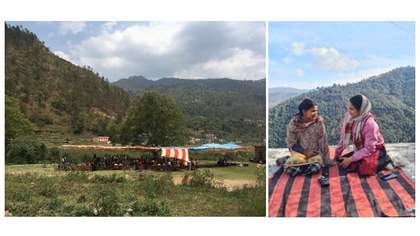Department: Learning
Host: Emily Pringle, Head of Learning, Practice, Research and Policy
Aastha researched Tate’s archive of past, current and future projects with artists involved in socially engaged practices. The aim was to understand more about learning ideas and frameworks that could inform Aastha’s research on non-state supported community art programmes.
During her time at Tate Aastha presented a seminar about socially engaged activism, her work in Delhi with the KHOJ Artists’ Association and findings from her Fellowship at Tate and Delfina.
Aastha produced a short research paper outlining observations around the role of artists in socially engaged practices at Tate. She observed and participated in Tate’s existing Community and Access learning programmes, with a focus on artist-led activities. Aastha also curated small group discussions at Delfina Foundation around socially engaged practices in India.

Village meeting at Jardhar Gaon for Henvalvani Community Radio
Further collaboration with Tate
2015
Blurred Lines: Art, Activism, Popular and Social Change
Aastha returned to Tate in 2015 to take part in a Learning Research Secondment hosted by Emily Pringle, Head of Learning Practice and Research. From the Secondment came a research paper, ‘Blurred Lines’, which built on the topic explored by Aastha during her Fellowship. The paper highlights some of the core issues related to funding structures available for socially engaged practices in India, with an emphasis on their limitations and pitfalls.
2019
Tate Young Peoples Programme - Tate x TENT programme ‘Build, Break or Recreate?’
Through her research, Aastha is engaged with issues around knowledge production and dissemination on the internet, and in particular how Delhi-based hip hop collectives are challenging the caste system-driven power structures of cultural and knowledge producers in India through smartphone culture.
In November 2019 Aastha contributed to the Tate x TENT programme titled ‘Build, Break or Recreate?’ This programme, led by Tate’s Young People’s Programme, also explored hierarchies of ‘high’ and ‘low’ culture, and who gets to define it; the power relationship between institutions and communities, and between gatekeepers and producers, across London and Rotterdam – two diverse European cities.
As part of the programme, Aastha gave a special presentation on her research at the welcome dinner attended by Tate staff and the range of young people, creatives, thinkers and cultural producers from London and Rotterdam who contributed to the programme.
Supported by the Brooks Programme, Aastha spent five days in London with the team and took the opportunity to reconnect and consider future collaborations with Mark Miller, Head of Programme and Practice – Learning, and Emily Pringle, who had been her Fellowship Host in 2014.
Biography
Aastha is an artist and curator, who currently teaches Curating Public/Community Art projects at Srishti Manipal Institute of Art, Design and Technology, in Bangalore. Her art projects are public, socially engaged and site specific. Collaborative and multidisciplinary in nature, they are mostly self-funded/self-sustained long-term engagements. They have been mainly developed in two geographical contexts: in the Khirkee neighbourhood in Delhi and in the Himalayan district of Chamba, Uttarakhand.
In Delhi, Aastha led citywide projects, such as the Delhi Walk Festival, as well as neighbourhood level projects, such as the International Khirkee Festival, Extension Khirkee Festival, Aapki Sadak.
In Chamba, an area that is home to historical feminist environmental movements (i.e. the Chipko movement of tree huggers and the Beej Bachao Andolan, or Save the Seed Movement), Aastha serves as a board member of the Henvalvani Community Radio station, a project she joined in 2007.
More information:
Academic Profile Page
